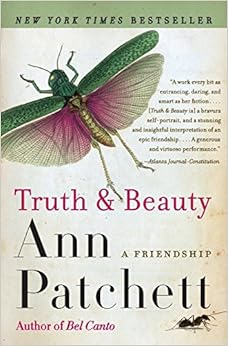
Truth and Beauty: A Friendship is the bestselling memoir of the friendship between the author, Ann Patchett, and Lucy Grealy (The Autobiography of a Face). It is borne from Ann's grief upon Lucy's death following almost twenty years as dear compadres.
This is a tale of truth - the cruel honesty stemming from a relationship that rivals the intense closeness of marriage or motherhood. Ann shares with us the intimate details of the life of a creative genius, a butterfly, that refused to be pinned down. With courage, she tells us who Lucy really is, what she struggled with, and the effects upon those that loved Lucy.
The book is interspersed with Lucy's own writings, letters to Ann from wherever she happened to be. They were written during times of sadness, uncertainty, pure poetry. Paired with Ann's remembrances, they create a complete picture of two women who loved writing and each other.
Lucy is a desperate poet - talented but full of suffering that words cannot ease. She endured 39 surgeries over twenty years to try and bring her face to a semblance of "normal". Through this book, we find her sadness and despair, her vibrant sexuality and utter loneliness, her openness and unanswered desires.
But this story isn't about Lucy. It is about the earthquakes and typhoons Lucy brought to Ann's life. It is about the eyes of the storm and Ann's measured, practical responses. It is about an enmeshment so deep that neither could live without the other.
I read an article written by Ann addressing the concerns Clemson University students/parents had about topics addressed in the book. Some thought the book was explicit in nature concerning drugs, sexuality, and even anti-religious themes. Ann's response was beautiful. She suggested that if these were real concerns, then maybe books such as The Great Gatsby, Anna Karenina, Lolita, One Hundred Years of Solitude, and works by Morrison, Updike, Hemingway and Faulkner should no longer be on a syllabus as well.
This book is indeed "explicit". It "fully and clearly expresse[s] or demonstrate[s]" the truth and beauty in the lives of these two women due to their willingness to be humble and vulnerable with each other. To be friends.

No comments:
Post a Comment